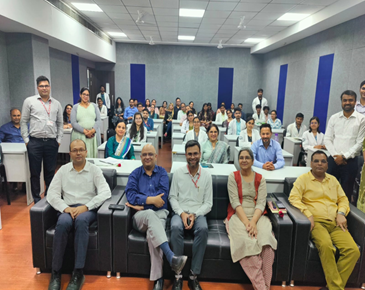Volume 7 Issue 10 October, 2017
Mental health in the work place
The last week saw us celebrating the World Mental Health Day with emphasis on ‘well-being at the workplace’ as Mental health being adversely affected by stress, internal conflict, time and energy demands, is now at an all-time high. To illustrate the above is a typical case. Mr. S a young intelligent 23 year old IT professional, from a non-consanguineous joint family, with a family history of ‘Anxiety Disorder ’ in his father, came with the complaints of “ inability to concentrate, poor self-esteem, anxious, apprehensive and fatigued since 1 year following, his joining the job. At the company he was ‘on the bench’ and the rumors of being laid off any time soon were worrying him. Besides this, he complained of indulging in a number of ‘meaningless’ repetitive rituals like adjusting his shirt, aligning his elbows on the armrest of the chair, positioning his laptop and office materials as well as his legs in a particular way , walking in a particular manner, making peculiar throaty noises “Because of a bubble which keeps coming up” disturbed sleep and poor appetite. On the home front it was noticed that he had certain repetitive ritualistic actions before his bath time and at meal times. He had overprotective parents and an abusive over critical elder brother. Early history did not reveal him to have any significant developmental or medical issues, though premorbidly, he was apprehensive, suffered from feelings of insecurity and low self-esteem and did not have too many close friends, hobbies or an active outdoor life. A Diagnosis of Obsessive Compulsive Disorder was entertained and as he was intelligent and highly motivated, and had a compliant and cooperative family who were ready to support all treatment plans, a package programme comprising of High intensity CBT (including exposure and response prevention following training in Deep Muscular Relaxation Techniques, followed by SD (Systematic Desensitization) Cognitive monitoring, therapeutic initiatives aimed at increasing his self-esteem, a systematic sleep and daytime schedule and family counseling was attempted. After two to four weeks of intensive daily sessions in the clinical setting and follow up, daily practice sessions at home, patient and family reported around 80% decrease in his symptoms. He rejoined work got selected on a project, and was coping reasonably well, in spite of very heavy demands from his client. Since the last 8 months, he reports his graph (feeling of being in control and sense of wellbeing) is “steadily peaking to an optimum”.
Surely, this is a time to take serious stock of the impact of stress, be it at the work or the academic front. Special emphasis in the wellbeing of students, especially that of medical students is imperative at this moment, as more and more, it is being reported that their health, creativity and intellectual productivity is seriously compromised by stress. At this juncture it goes without saying, that student coping in medical colleges must be enhanced psychological support, social/health activities, mentorship and intellectual stimulation and that proper measures to ensure the above must be in place, as our students of today are the backbone of the Workforce of tomorrow.

currently Consultant Clinical Psychologist JNCASR Jakkur Bengaluru)


